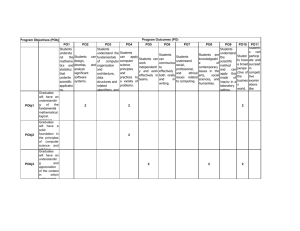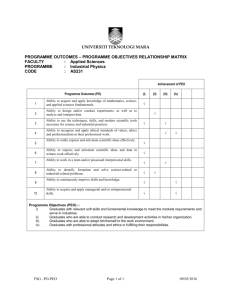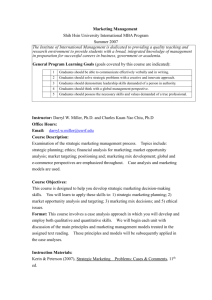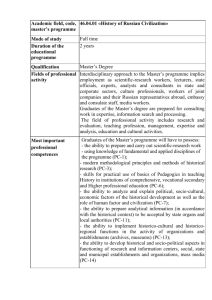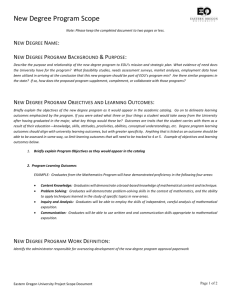IME 412 Design and Analysis of Experiments
advertisement
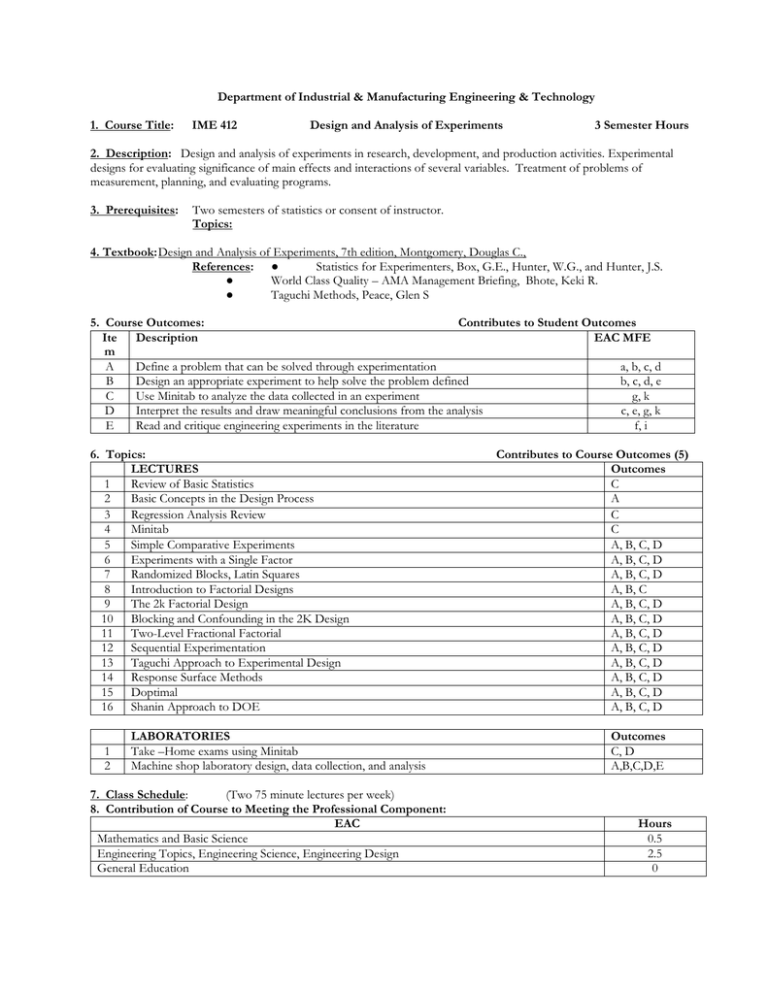
Department of Industrial & Manufacturing Engineering & Technology 1. Course Title: IME 412 Design and Analysis of Experiments 3 Semester Hours 2. Description: Design and analysis of experiments in research, development, and production activities. Experimental designs for evaluating significance of main effects and interactions of several variables. Treatment of problems of measurement, planning, and evaluating programs. 3. Prerequisites: Two semesters of statistics or consent of instructor. Topics: 4. Textbook: Design and Analysis of Experiments, 7th edition, Montgomery, Douglas C., References: ● Statistics for Experimenters, Box, G.E., Hunter, W.G., and Hunter, J.S. ● World Class Quality – AMA Management Briefing, Bhote, Keki R. ● Taguchi Methods, Peace, Glen S 5. Course Outcomes: Contributes to Student Outcomes Ite Description EAC MFE m A Define a problem that can be solved through experimentation a, b, c, d B Design an appropriate experiment to help solve the problem defined b, c, d, e C Use Minitab to analyze the data collected in an experiment g, k D Interpret the results and draw meaningful conclusions from the analysis c, e, g, k E Read and critique engineering experiments in the literature f, i 6. Topics: LECTURES 1 Review of Basic Statistics 2 Basic Concepts in the Design Process 3 Regression Analysis Review 4 Minitab 5 Simple Comparative Experiments 6 Experiments with a Single Factor 7 Randomized Blocks, Latin Squares 8 Introduction to Factorial Designs 9 The 2k Factorial Design 10 Blocking and Confounding in the 2K Design 11 Two-Level Fractional Factorial 12 Sequential Experimentation 13 Taguchi Approach to Experimental Design 14 Response Surface Methods 15 Doptimal 16 Shanin Approach to DOE 1 2 LABORATORIES Take –Home exams using Minitab Machine shop laboratory design, data collection, and analysis 7. Class Schedule: (Two 75 minute lectures per week) 8. Contribution of Course to Meeting the Professional Component: EAC Mathematics and Basic Science Engineering Topics, Engineering Science, Engineering Design General Education Contributes to Course Outcomes (5) Outcomes C A C C A, B, C, D A, B, C, D A, B, C, D A, B, C A, B, C, D A, B, C, D A, B, C, D A, B, C, D A, B, C, D A, B, C, D A, B, C, D A, B, C, D Outcomes C, D A,B,C,D,E Hours 0.5 2.5 0 9a. Relationship of Course to MFE Student Outcomes: (based on 1 to 5 scales, 5 denotes very strong continuation to the student outcome and blank cell denotes that the course does not continue the related student outcome) Cod Student Outcomes, A Graduate from the Program Will Have: Contribution e a b c d e f g h i j k Manufacturing Engineering graduates will have an ability to apply knowledge of mathematics and science to manufacturing processes, materials, and design of manufacturing systems Manufacturing Engineering graduates will have an ability to design and conduct experiments, and to analyze and interpret data related to manufacturing processes, materials evaluation, and manufacturing systems Manufacturing Engineering graduates will have an ability to design, select, implement, and control a manufacturing system and its components or processes to meet desired needs Manufacturing Engineering graduates will have an ability to function on multi-disciplinary teams and the ability to apply a concurrent approach and project management to process and product development Manufacturing Engineering graduates will have an ability to identify, formulate, and solve manufacturing engineering problems through a hands-on approach that considers constraints, costs, benefits, and comparative processes and materials Manufacturing Engineering graduates will have an understanding of the professional and ethical responsibilities of a manufacturing engineer Manufacturing Engineering graduates will have an ability to effectively communicate technical concepts through appropriate methods Manufacturing Engineering graduates will have an understanding of the impact of manufacturing engineering solutions in a global, economic, environmental, and societal context Manufacturing Engineering graduates will have a recognition of the need to engage in lifelong learning Manufacturing Engineering graduates will have a knowledge of contemporary issues facing manufacturing engineers Manufacturing Engineering graduates will have an ability to use the proper techniques, skills, and modern engineering tools necessary for manufacturing engineering practice utilizing supporting technologies 10. Prepared by: Joe Emanue 4/2013 Reviewed by: Curriculum Committee 3.3 4.07 2.5 3.79 3.5 2.5 4 — 2.92 — 2.88



